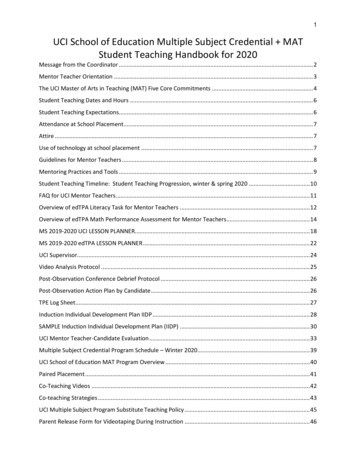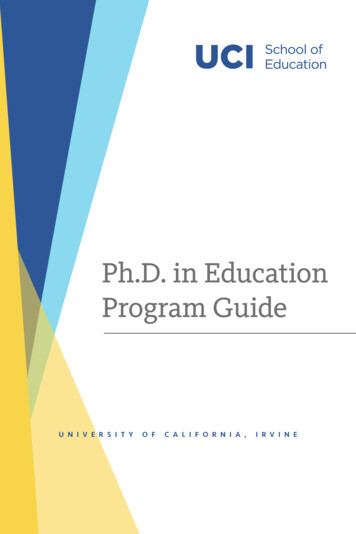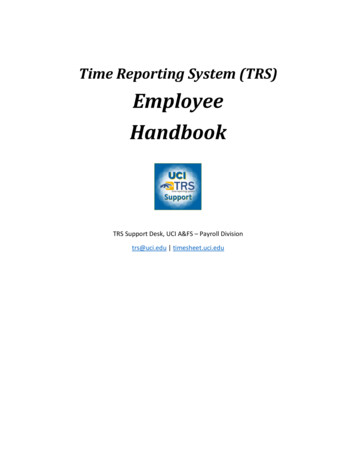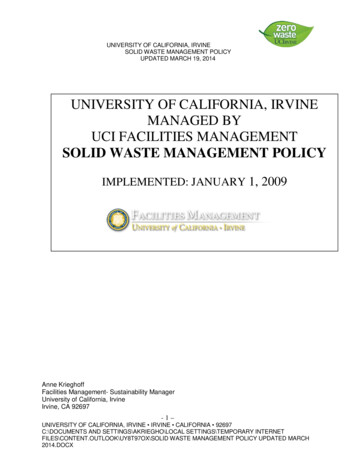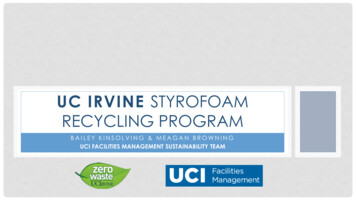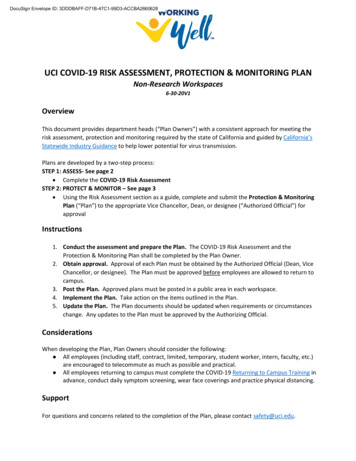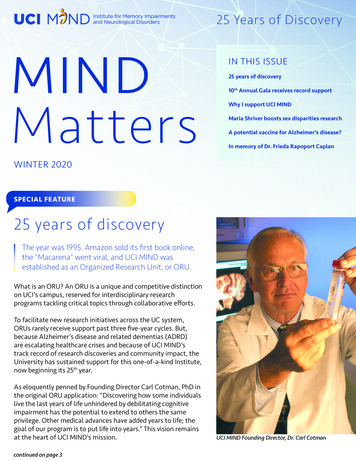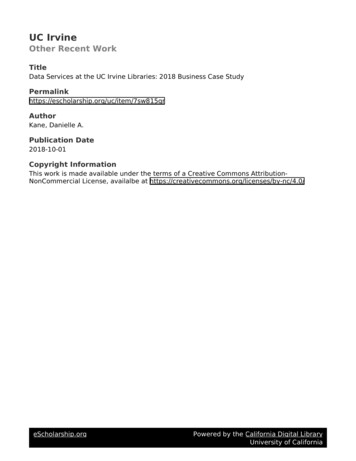
Transcription
UC IrvineOther Recent WorkTitleData Services at the UC Irvine Libraries: 2018 Business Case 815grAuthorKane, Danielle A.Publication Date2018-10-01Copyright InformationThis work is made available under the terms of a Creative Commons AttributionNonCommercial License, availalbe at holarship.orgPowered by the California Digital LibraryUniversity of California
October 2018Data Services at the UCI IrvineLibraries2018 Business Case StudyFrom: Danielle KaneResearch Librarian for EmergingTechnologies and Service InnovationTABLE OF CONTENTSEXECUTIVE SUMMARY0
October 2018Recommendation:While the funding for a Data Curation Specialist is being determined, the UCI Librarieshave a need to provide interim direction, documentation, training, and education. Irecommend adding data curation as an interim assignment to a current librarian’s jobdescription. This librarian can start to develop documentation and best practices for datacuration services, assist DSS with consultation, develop talking points for subject liaisons,and assist with providing training/education on data topics. See page 4 for fullrecommendation.Why should the UCI Libraries provide Data Curation Services? The UCI Libraries, as a central and neutral space can provide services to allsegments of the organization from faculty to students, from the arts to the sciencesand can also serve as a hub to track available services and make appropriatereferrals.It has also been noted in other reports that UC Irvine is at risk of losing current andsubsequent grant funding if we cannot adequately meet funder requirements. TheUCI Libraries can assist the campus community with funder compliance.Libraries have historically identified, selected, organized, described, preserved, andprovided access to information, extending services to data curation is a naturalextension to the role we already serve. Libraries are also central to the campus andare already known for providing guidance and assistance.Process: Researched the current state of Data Curation Services in academic libraries, withinthe University of California, and at UC IrvineEvaluated past DSS consultations to see how they fit into the data curation lifecycle.See page 7Investigated possible case study projects to determine faculty/researcher needs.See page 9Introduction:Data curation is the management of data throughout its lifecycle, from creation,maintenance and then archived for future access and analysis. The main purpose of datacuration is to ensure that data is reliably retrievable for future research purposes or reuse.At its most basic, what everyone (administrators, researchers, librarians, etc.) wants is fordata to be findable, to be accessible, to be interoperable, and to be reusable.In fact, according to NFAIS (2016), “In this new era everyone must be data literate todefine problems, wrangle data, self-manage data, choose methods and tools, analyzedata, communicate their findings and engage in lifelong learning.” There is a long way togo before this utopia of 100% data literacy is reached. Coates (2014) stated that “many1
October 2018researchers have neither the time nor the training to manage their data in ways tofacilitate the reproducibility, openness, and interoperability encouraged by funding agencypolicies. One common thread amongst all the literature on data curation is thatresearchers struggle with all stages of the data lifecycle. From proposal planning andwriting, project start-up, data collection, data analysis, data sharing, and the end of theproject. Several studies show that researchers’ need vary by discipline and that data skilllevels and knowledge will also vary within that discipline. One solution to support datacuration may not be sufficient.Appendix IA. Important Definitions:Data - is a set of values of qualitative or quantitative variables. Data is measured,collected, reported, and analyzed, whereupon it can be visualized using graphs, images, orother analysis tools. Data as a general concept refers to the fact that some existinginformation or knowledge is represented or coded in some form suitable for better usageor processing.Digital Asset Management (DAM) - consists of management tasks and decisionssurrounding the ingestion, annotation, cataloguing, storage, retrieval, and distribution ofdigital assets. Digital photographs, animations, videos, and music exemplify the targetareas of media asset management2
October 2018Data Curation (Management) – management activities related to the organization andintegration of data collected from various sources, annotation of data, and publication andpresentation of data such that the value is maintained over time, so that the data remainsavailable for reuse and preservation.Data Science – an interdisciplinary field about processes and systems to extractknowledge or insights from data in various forms, either structure or unstructured. Is acontinuation of some of the data analysis fields such as statistics, machine learning, datamining, and predictive analytics.E-Science - the application of computer technology to the undertaking of modernscientific investigation, including the preparation, experimentation, data collection, resultsdissemination, and long-term storage and accessibility of all materials generated throughthe scientific process.Researcher - someone who conducts research, i.e., an organized and systematicinvestigation into something. Can refer to faculty, students, and/or staff in this document.B. BackgroundA rising conversation at the University of California, Irvine is the state of data,infrastructure, and researcher support. While UCI has made strides since 2013 to improveResearch Cyberinfrastructure (RCI) on campus it still remains a weakness. The Vision forResearch Cyberinfrastructure at UCI stated that, “Campus support for the increasing loadof data and digital asset management is currently distributed, loosely coordinated, and notstaffed to the level of peer institutions.” One of their many recommendations was to hirea library data curation specialist to develop tools and workflows for data management.The report compared the UCI Libraries’ Digital Scholarship Services staffing to both Purdueand the University of Oregon and UCI had significantly fewer. Not only that but in mycomparison of all ten UC campuses of the current and planned data services, UCI Librarieswould rank quite low. Most other UC campuses have a significantly higher number of staffdedicated to Data Curation services and have significant web presences. This reportrecommended funding a “Library Data Curation Specialists to support funder compliance,manage collections of campus produced data, work with the Office of Research toimplement data management training programs, and promote open access.”According to Gold (2010) there is a “.conceptual shift away from viewing libraries asprimarily collections-oriented repositories of information towards viewing them as serviceproviders that actively support the exchange of ideas and knowledge across thedisciplines.” In addition, Luce (2008) stated that “ libraries work across academic andorganizational boundaries; data management and curation is not scalable in siloedenvironments.” In 2010 the Ligue Des Bibliotheques Europeennes de Recherche (LIBER)created an e-science working group to investigate libraries and their roles in the field of escience. Focusing on Research data as the most urgent element the group developed thetop ten recommendations for libraries to get started with research data management:1. Offer research data management support, including data management plans forgrant applications, intellectual property rights advice and information material.2. Engage in the development of metadata and data standards and provide metadataservices for research data.3
October 20183. Create data librarian posts and develop professional staff skills for datalibrarianship.4. Actively participate in institutional research data policy development, including eresource plans.5. Liaise and partner with researchers, research groups, data archives and datacenters to foster an interoperable infrastructure for data access, discovery, anddata sharing.6. Support the lifecycle for research data by providing services for storage, discoverand permanent access.7. Promote research data citation by applying persistent identifiers to research data.8. Provide an institutional data catalogue or data repository, depending on availableinfrastructure.9. Get involved in subject specific data management practice.10.Offer or mediate secure storage for dynamic and static research data in cooperation with institutional IT units and/or seek exploitation of appropriate cloudservices.With the retirement of the librarian who previously handled Social Science Data the UCILibraries has the opportunity to strategically hire or to assign the role to improve servicesto the campus in the area of data curation. The UCI Libraries also developed a newstrategic plan; Pillar 1 focused on expanding the libraries capacity to improve lives by: Enhancing the global visibility, reproducibility, and societal impact of UCI’s researchby providing leadership in the creation and implementation of enabling technologiesand services that facilitate effective management, sharing, discoverability, andpreservation of research output. Contribute to the development of UCI’s research cyberinfrastructure and embeddinglibrarians throughout the research lifecycle.C. RECOMMENDATIONWith the rise of international, national, and local open access policies extending to data,UCI researchers are being asked to manage and share their data more than ever before.Data curation is considered to be very messy at all stages of the data life cycle andresearchers need expert support and guidance in how to manage their data throughoutthe process. At the same time the field is facing a deficit of people trained in how tohandle big data – in how to aggregate and filter data, present data, analyze data to gaininsights, and manage data for long term preservation. In tandem with the Data CurationServices business case, recommendations for hiring a Data Curation Librarian have beenmade in “A Vision for Research Cyberinfrastructure at UCI.”Option 1: Add Data Curation to a current Librarian’s dutiesThe UCI Libraries can move forward with data curation services at varying levelsdepending on what duties the librarian chosen already supports, what percentage of timethey can devote to data services, and what their skill levels are with dealing with data.Depending on the skills of the chosen librarian the libraries might want to considerensuring that training opportunities like the following are available: UCI Data Science Certificate Program: http://ce.uci.edu/areas/it/data science/4
October 2018 Data Scientist Training for Librarians: http://altbibl.io/dst4l/Note: Data Curation Services cannot happen with only one person, it will take thecommitment of subject liaisons to learn about data curation and to serve as the point offirst contact, helping researchers when they can and referring when needed. To do this willrequire the creation of a training program for subject liaisons, clear documentation aboutwho handles what at UCI for referral processes, and the creation of outward facing guidesthat could hopefully help answer simple questions for researchers.If Data Curation Services are added to a current librarian’s portfolio the UCI Libraries mayneed to make tough decisions on the level of support that can be provided to the campuscommunity. The services provided by a part-time data curation librarian would bynecessity be smaller than those provided by a 100%-time librarian focused solely on datacuration. A 100%-time librarian for data curation would be able to handle the items inMandatory preparation and core service and depending on their background some of theitems in the Outside of Core Services section. A librarian spending part of their time ondata curation would be able to tackle significantly less because of other responsibilitiesand duties.Mandatory Preparation:o Evaluate and possibly improve web presence (research guides, DSS page)about data curation, finding data, and data visualizationo If possible, have the guide point to other campus contacts for data relatedtasks outside the realm of data curation.o Develop internal data training for subject liaisons on data curationCore Services:o Data Management Supporto Best Practices for Managing Datao Archiving and Sharing Datao Data Workshopso Refer researchers to appropriate campus contacts for data related servicesoutside of the scope of data curation.Outside of Core Services (could be included or separate depending on staffing):o Metadata and standards supporto Purchasing, Acquisitions, and Licensing of datao Institutional repositories (IR)o GIS and spatial analysis supportOption 2: Hire a Librarian for Data CurationIf funding for a Data Curation Librarian is not made available through ResearchCyberinfrastructure the library should further consider funding the position. Moreapplicable to the needs of the UCI Libraries would be a librarian who either haseducational experience in informatics or previous experience in managing data curationservices. This librarian could:5
October 2018 Provide Data Curation services to researchers in all disciplines.Building demand for Data Curation services.Understand and unpack data management requirements.Participate in the conversation about data curation on a local and national level.Develop training and teaching opportunities for the UCI community and UCI Librarystaff.Be a liaison to Data Science Initiative and the Office of ResearchPromote Data Curation services to the campus communityIt is important to note that Data Curation in institutions require a high level of participationon the part of administration and requires new, sustained funding and differently trainedstaff. Planning for data curation services is not a static event but needs to be a continuousprocess to ensure long term success. Overall, in data there is an urgent need forstandards, tools and best practice models for both file formats and disciplines. To staycurrent the UCI Libraries will need someone to stay current of advances in this area.Implementing data curation services can be considered a resource drain, decisions atsome point might need to be made on what the UCI Libraries should discontinue doing topursue providing data curation services.D. DATA CURATION SERVICESSince researchers need help throughout the data lifecycle, I recommend buildingconsulting services and marketing that touches on each the areas below: creating,processing, analyzing, preserving, access, and re-use. Implementing consultation serviceson multiple topics can be difficult and time consuming, especially if the responsibility forData Curation is added to a librarian’s current duties. They may need time to research andlearn about some of the areas in the data lifecycle. To try to narrow down which areas theUCI Libraries should focus on first the Faculty Interactions Database was mined for datarelated interactions and requests. Most of the requests fell into the area of creating data,data preservation, and access of data, I would recommend that these three topics be theinitial focus when building the data curation consultation service.Creating data Design researchPlan data management (formats, storageetc.)Plan consent for sharingLocate existing dataCollect data (experiment, observe,measure, simulate)Capture and create metadataProcessing data Enter data, digitize, transcribe, translateFigure 1: Data Lifecycle ata-life-cycle/6
October 2018Check, validate, clean dataAnonymize data where necessaryDescribe dataManage and store data Analyzing data Giving access to dataInterpret dataDerive dataProduce research outputsAuthor publicationsPrepare data for preservationPreserving data Distribute dataShare dataControl accessEstablish copyrightPromote dataRe-using dataMigrate data to best formatMigrate data to suitable mediumBack-up and store dataCreate metadata anddocumentationArchive data Follow-up researchNew researchUndertake research reviewsScrutinize findingsTeach and learnSource: UK Data ArchiveThe UCI Library’s Data Curation service can assist and provide training to researchers infollowing best practices in writing effective and compelling data management plans. Thelibrary can also provide support in describing and depositing data to ensure data is easilyfindable and citable by placing it in the proper repository. The UCI Libraries Data Curationservice could also help to ensure that data can be sustainably accessed in the future.E. Data Related Interactions in Faculty Interactions DatabasePrevious RequestsPart of the data lifecyclePossible ConsultationService/Referral thatcould have assisted withrequestCreation/revision of DataManagement Plan (DMP)Creating DataConsultation with DataCuration Librarian aboutDMP’s – referral to DMP Tooland other resources.Request to gain access tothe Databrary systemCreating DataReferral7
October 2018Loading data into DASH Data repositories andopen access General questions onUCI Dash and OrangeCounty Data Portal.Preserving, access, and reuse of dataPotential Dash/OC DataPortal Data donor agencyNROCConsultation with DataCuration Librarian re: DASHtoolConsultation with DataCuration Librarian re: DASHtoolData miningCreating DataConsultation with DataCuration Librarian – gettingdata out of librarydatabasesHosting and sharing of 60GB of experimental dataPreserving, access, and reuse of dataConsultation with DataCuration Librarian re: DASHtoolRead an old data encodingformat (i.e. EBCPAK)Re-using dataReferralData backup and storagePreserving and access todataConsultation with DataCuration Librarian aboutrepositories.Reassure outside entitiesthat UCI can securely storesensitive data.Data management and howto create a personaldatabase.Preserving and access todataReferralProcessing DataConsultation with DataCuration Librarian aboutbest practices of datamanagement.Use Atlas TI to do opencoding and memoing oninterview and forum data. Iwould also like consultationon the most effectivemanner of makingscraped .json files intohuman-readable data, ifpossible.Creating, processing,analyzing dataInitial consultation withData Curation Librarian fordiscussion on possiblesoftware tools and needs.Then referral to metadataperson about scraping .jsonfilesCreating, processing,analyzing, and accessInitial consultation withData Curation Librarian &possible referral. First stepwould be creation of a data Visualize and mapdatagenerate a metadatabase8
October 2018 aggregating thecontentBest way to organizethe dataCreate exploratorymaps that wouldvisual data. Theinterface shouldoverlay historical citymaps against thecontemporarylandscape of LosAngeles.management plan (DMP)F. Example of Faculty supportA faculty member requested assistance with the organization, formation, and versioning ofa multi-year research project. When discussing the situation, it became apparent thatassumptions were made about the skills and knowledge of graduate students hired to helporganize and input data. The professor ended up with multiple spreadsheets all formatteddifferently that they currently cannot compare across. This requires them to go back andcreate a master spreadsheet, resolve old labeling and header issues, and verify older datain preparation for visualization and mapping for inclusion in a future monograph. Servicesthat could have helped are: Training in creating a data management planTraining for graduate students in data management and data best practicesVersioning and file namingBest practices for data managementAppendix IIG. UCI LibrariesThe UCI Libraries has a history of creating teams for both data and GIS:Data Team: The Data Team (multiple team charges in 2010 & 2011) was responsible formonitoring data-related developments both on campus and at CDL, to implement ways toinform library staff about how disciplines utilize research data, to educate staff on dataresources and services, and address data literacy for users. For a time, focus was placedon data related sources and tools but in recent years more focus has been placed onlibrary purchased data sets and resources.9
October 2018Geographic Information Systems (GIS) Implementation Team: Formed in 1997 the GISteam was created to “focus on planning and developing GIS services in the library.” Theteam made advances in GIS software and documentation, GIS web page development,promotion, GIS liaison and collection development, and instructional and support services.A team was again charged in 2008 to re-vision the previous GIS program by reviewing theprogram and recommending changes. The final report stated that the UCI Librarieseffectively refers and/or can respond to questions regarding platforms or data. The secondpoint was that there was no “expert” on staff that could provide assistance with ArcGIS.The final report also mentioned that historically the Libraries have not needed to recruitsomeone with a substantive GIS background. A meeting was scheduled with our currentlibrarian responsible for GIS at the UCI Libraries, during this meeting we discussed thecurrent state of GIS and found that it is much the same as it was historically. The biggestissues are that library users don’t know how to use the tools, that data is inherentlydifficult to deal with, and that they would like access to more tools. The tasks that are themost labor intensive are big census related questions which can take 3-5 hours ofresearch and the process of identifying data sets and/or getting data for secondaryanalysis for library users.Subject Liaison Interviews:1. Engineering Engineering is not overwhelmed with questions about Data Curation, mostly therequests are for data sets.Need for how to get data ready, how to manage it, how to anonymize and set it up.GIS could be biggerQuarter doesn’t allow for big projectsNot using the data from the databaseResponsive to no demand versus building demandHow to integrate data into classroom teachingData management problemNo UCI data management policy2. Business Primarily questions about purchasing data sets3. Social sciences data Purchasing data setsPulling data from library databasesAssisting with data management plans and referring to data repositoriesDASH, DMP tool, Merritt, etc.4. Medicine Primarily need support with compliance to the NIH Public Access PolicyVery few data requests beyond NIH10
October 2018H. UCI Data Related Services:Office of Information Technology (OIT) Data CenterSystem AdministrationBackupsOIT Data Center Co-location ServicesComputing Resources:o GISComputing HardwareClusters:o HPCo Virtual ServersUCI Lightpath NetworkResearch SoftwareResearch Computing SupportUCI Center for Statistical ConsultingThe Center works on a recharge basis per hour of support, they provide support in thefollowing areas: Study design and power analysis for experiments, surveys and observationalstudiesChoice of statistical methods and their proper applicationInterpretation of results, including their limitationsGrant preparation and the preparation and review of manuscripts11
October 2018I. UC Libraries Data Curation ServicesUC Berkeley – The Data Lab: http://www.lib.berkeley.edu/libraries/data-labThe lab offers consultations to current UCBerkeley students, staff and faculty onresearch involving numeric data,including finding and recommending datasources and advising on technical dataissues such as file format conversion,web scraping, and basic statisticalsoftware use. The Lab also providesworkstations with analytical softwaresuch as ArcGIS, Stata, SAS, SPSS, Stata,R, and Python. The Data Lab alsoprovides assistance with: Research Data ManagementData Acquisition and AccessProgram (funding for data)Services Provided: Staff: 4 membersResearch assistance in locating,recommending, and acquiringnumeric data.Statistical software support forsuch packages as R, Stata,SPSS, SAS, and Python.Instructional support forcourses with a data analysiscomponent.Workstations and laptopsloaded with commonly useddata analysis software.Space for individual and groupwork. Librarian for Economics,Political Economy, andInternationalGovernment InformationLibrarian for Federal andState GovernmentInformation, PoliticalScience, Public Policy andLegal StudiesData LibrarianResearch DataManagement ServiceDesign AnalystUC Davis – Digital Scholarship: p/12
October 2018Services Provided: Data Design and SustainabilityData Analysis and Visualization Support with designing andimplementing a sustainabledata storage strategy.Analyzing and visualizing datato advance research activities,and for publication andpresentation.Staff: Based in IT, 4 total w/3vacant Data Sys Supv II Vacant; Data Sys Anl 3[GIS DataCurator/Specialist] Vacant; Data Curator,TBD Vacant; Data Curator,UC Irvine - Digital Scholarship Services: http://www.lib.uci.edu/dssWrite grant winning Data ManagementPlans. Deposit data into repositories foraccess and preservation. Increasereproducibility.We can help you with all stages ofdata management required byfunding agencies DMPTool Dash EZIDStaff: None specifically for DataUCLA – Data management & Curation Services: management-curation-servicesAs part of the UCLA Library's efforts tosupport scholarly communication and theuniversity's research mission, it assistsstudents, staff, faculty, and researcherswith data management across the full lifecycle of research projects. Librarians andstaff from the campus libraries canprovide subject-specific guidance tailoredto individual researchers' data needs.Planning ahead about how to manageresearch data ultimately saves time,ensures that data is properlydocumented and reproducible, andcreates opportunities for collaboration.Services Provided: General data managementData discoveryData management plansCopyright and licensing dataDOIsREDCapGeospatial dataStaff:In the Digital Initiatives andInformation Technology Division(2 staff): Data Archive Data Management13
October 2018Additionally, many funding agenciesrequire that grant proposals include aplan for how research data will bemanaged and shared.UC Merced – Research Data Curation: esearch-data-curationThe library can assist faculty andresearchers with the many-faceted stepsof research data curation—frompreparing research data managementplans (which are required for manyfunding agencies), through filemanagement best practices andmetadata creation, to data sharing anddata archiving.Services Provided: Data Management PlansBest Practices for ManagingDataArchiving and Sharing DataResearch Data ManagementGlossaryResearch Management ToolkitWhat is a Data DictionaryStaff: 1 Data Services Librarian(also a subject liaison) Library Liaisons alsoprovide direct support forthe following:UC Riverside – Managing Your Data: -your-data14
October 2018Managing your data is critical to thesuccess of your research, grant-seeking,and publication efforts.Before starting a new research project, itis critical to develop a data managementplan (DMP), which outlines your practicesfor collecting, organizing, backing up, andstoring the data your research generates.Services Provided: Data Management PlansDepositing DataHelp plan what happens toresearch data before, during,and after research projectProvide workshops andinstructional materials onworking with dataIdentify and provide access tomajor data setsStaff: No org chart and no stafflisted requests go todataconsult-lib@ucr.eduUC San Diego – Research Data Curation Program: esearch Data Curation ProgramServices Provided:Staff:Program DirectorTechnical AnalystMetadata SpecialistResearch Data Strategist Liaison LibrarianData Curation Specialistand Faculty Liaison Librarian Digital PreservationAnalyst Library Data LibrarianUC San Francisco – Data Sharing & Data Management: http://guides.ucsf.edu/datamgmtThe UC San Diego Library’s ResearchData Curation Program supports the coredata needs of our campus community. Data Management: Follow bestpractices. Write an effectivedata management plan.Sharing and Discovery:Describe data and deposit it ina repository. Make data citable.Digital Preservation: Ensuresustainability by putting data ina digital archive. 15
October 2018Not sure how to organize your data?Need help sharing your data to meetpublisher requirements? Looking forUCSF-specific data managementtools?Services Provided: Make a Data Management PlanFind DataOrganize DataStore DataSecure DateVisualize DataFollow Data Sharing PoliciesShare DataUCSF Research DevelopmentOffice (RDO) TemplatesStaff: 1 data managementLibrarian1 liaison librarianUC Santa BarbaraLaunched July 1 – no website yetServices Provided:Staff: DirectorGeospatial Data CuratorHumanities Data CuratorAssistance from otherlibrariansUC Santa Cruz – Research Data Management: http://guides.library.ucsc.edu/datamanagement/We assist UCSC faculty, staff, researchersand graduate students with strategiesand tools for organizing, managing andpreserving research data throughout theresearch data life cycle.Services Provided: Create a Data ManagementPlanManage DataPublish, Preserve and Back UpFind Data for ReuseStaff: 9 librarians from 3departments.16
October 201817
October 2018SUPPLEMENTAL READINGS A vision for research Cyberinfrastructure at UCI
UCI Libraries can assist the campus community with funder compliance. Libraries have historically identified, selected, organized, described, preserved, and provided access to information, extending services to data curation is a natural extension to the role we already serve. Libraries are also central to the campus and




